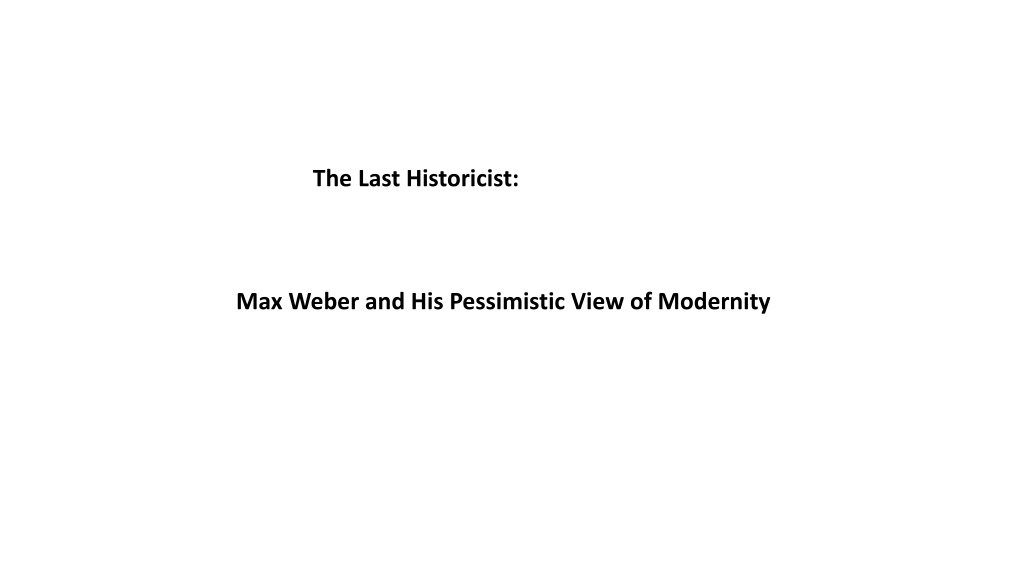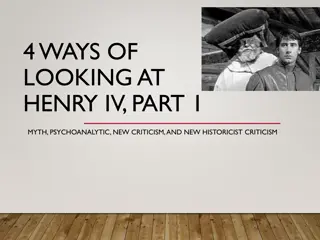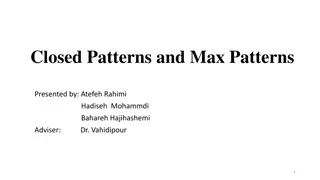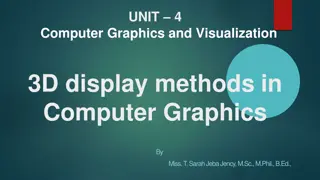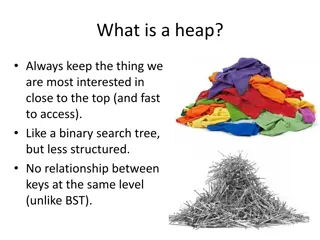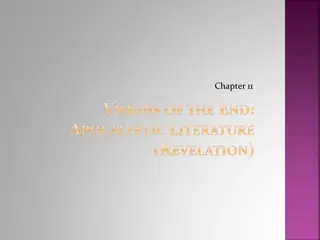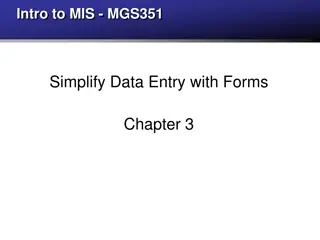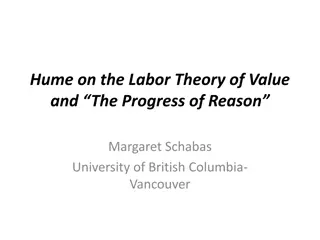Understanding Historicist Views: Max Weber's Perspective
Max Weber, a prominent sociologist, explored the historicist perspective by emphasizing the impact of history on all aspects of human culture and values. His critical approach highlighted the fluid nature of societal elements and the need to understand them within their historical context. Additionally, Weber stressed the importance of individual actions in shaping collective entities, rejecting the notion of a collective personality. He advocated for a sociology of Verstehen, which involves empathetic understanding and intuitive connection between observer and observed. This nuanced approach challenges the idea of purely objective scientific analysis in studying cultural phenomena.
Download Presentation

Please find below an Image/Link to download the presentation.
The content on the website is provided AS IS for your information and personal use only. It may not be sold, licensed, or shared on other websites without obtaining consent from the author. Download presentation by click this link. If you encounter any issues during the download, it is possible that the publisher has removed the file from their server.
E N D
Presentation Transcript
The Last Historicist: Max Weber and His Pessimistic View of Modernity
Max Weber (1864-1920) One of the founders of sociology the scientific study of society -- which he defines as the study the togetherness of people
Def. Historicism Involves the fundamental historisation of all thinking about mankind, its culture and values. What does it mean to historicise all thinking about mankind? To historizise our thinking means to recognize and acknowledge that everything in the human world culture, values, institutions, practices-- . is made by history, so that nothing has an eternal form, permanent essence or constant identity which transcends historical change. The historicist holds, therefore, that the essence, identity or nature of everything in the human world is made by history, so that it is entirely the product of the particular historical process that brought it into being. (Beiser, The German Historicist Tradition, p. 2)
Political economy: The study of production and trade, and their relations with law, customs, and government, as well as with the distribution of national income and wealth. As a discipline its originated in moral philosophy in the 18th century and sought to explore the administration of states' wealth (e.g. Adam Smith) Only in the 19th century the term economy replaces that of political economy.
1. Focus on the individual (as Herder, Humboldt or Ranke) for sociological purposes there is no such thing as a collective personality, which acts . When reference is made in a sociological context to a state, a nation, a corporation, a family or army corps, or to similar collectives, what it means is only a certain kind of development of actual or possible social action of individual persons. (Weber, Economy and Society, 1968, p. 13)
1. Sociology of Verstehen (understanding) There is no absolutely objective scientific analysis of culture... All knowledge of cultural reality... is always knowledge from particular points of view. ... An objective analysis of cultural events, which proceeds according to the thesis that the ideal of science is the reduction of empirical reality to "laws," is meaningless... [because]... the knowledge of social laws is not knowledge of social reality but is rather one of the various aids used by our minds for attaining this end. Max Weber, Objectivity in Social Science, 1897 Involves empathetic liaison of the observer with the observed -- intuition
Context of Webers Writings: 1. Germany s late industrialisation (last 3rd of 19th century) 2. Rise of the natural sciences and the empirical method as a rival to the historical critical method and Verstehens-approach 3. The rise of scientific psychology (experimental psychology, Freud s theory of the unconscious 4. Empirical method spreads into other areas of knowledge production (positivism)
Positivism: Holds that only true and authentic knowledge is knowledge that is based on actual sense experience. Such knowledge can only come from affirmation of theories through strict scientific method. Any metaphysical speculation is supposed to be avoided. Important: Positivism also holds that society, like the physical world, operates according to general laws. Introspective and intuitive knowledge is rejected, as are metaphysics and theology. Modern form of positivism was formulated by the French philosopher Auguste Comte in the early 19th century.Comte argued that, much as the physical world operates according to gravity and other absolute laws, so does society.
Modern definition of objectivity, spreading at the time of Weber: Objective accounts are attempts to capture the nature of the object studied in a way that does not depend on any features of the particular subject who studies it. An objective account is, in this sense, impartial, one, which could ideally be accepted by any subject, because it does not draw on any assumptions, prejudices, or values of particular subjects . Stephen Gaukroger, in: N. J. Smelse and P. B. Baltes, P. B. (eds.) International Encyclopedia of the Social and Behavioral Sciences (Oxford, 2001), pp. 10785. Reminder: That is NOT how Ranke understood objectivity
Wissenschaft(en) = science(s): any scholarship that follows a systematic methodology ; NOT only natural sciences Geisteswissenschaft(en) (human sciences) Naturwissenschaft(en) (natural sciences understand human behavior in past and present --- Explain laws of nature
Marxs organisation of society Superstructure Relation of production Forces of production Development from the bottom up , no room for individuals; changes occur first in the area of the forces of production Roles in the economic system determine roles in the status system: broad strata of the population group together in terms of economic similarities Class system
Problem in Marx which Weber addresses in the Protestant Ethics How does consensus occur in a society across classes? Why do people things although they are not asked to do them? Marx solution Weber considers as inadequate: 1. emphasizes the role of purely external pressures on individuals: physical force, fraud and compulsion 2. Class members follow interests that come with their class membership more or less intuitively 3. Use of ideology, defined as an elaborated rationalization of a set of class interests; can be used to suppress a lower class; false consciousness , defined as a process by which men incorrectly assess the sources of their beliefs, rather than to their real roots in the system of production
There is no absolutely "objective" scientific analysis of culture... All knowledge of cultural reality... is always knowledge from particular points of view. ... An objective analysis of cultural events, which proceeds according to the thesis that the ideal of science is the reduction of empirical reality to "laws," is meaningless... [because]... the knowledge of social laws is not knowledge of social reality but is rather one of the various aids used by our minds for attaining this end. Max Weber, "Objectivity" in Social Science, 1897
Ideal-type Term used by Max Weber to denote entities (including types of action, societies, institutions) as constructed `hypothetically by an investigator from component elements, with a view to making comparisons and developing theoretical explanations. The elements out of which a `type is constructed are either empirically observable or historically recognised. The ideal is not a norm or an average; it is rather a construction that emphasises certain characteristics (of actions, societies, institutions, persons) that can be combined to form a coherent whole, or description. (E. Shils and H. A. Finch [eds], Max Weber on the Methodology of the Social Sciences, 1947)
Def. rationalisation: a set of interrelated social processes by which the modern world had been systematically transformed . The fate of our times is characterised by rationalisation and intellectualisation and, above all, by the "disenchantment of the world.
The aim of Protestant Ethics: .whether and at what points certain elective affinities are discernible between particular types of religious beliefs and the ethics of work-a-day life. By virtue of such affinities the religious movements have influenced the development of material culture, and (an analysis of these affinities) will clarify as far as possible the manner and the general direction (of that influence) We are interested in ascertaining those psychological impulses which originated in religious belief and the practice of religion, gave direction to the individual s everyday way of life and prompted to adhere to it . Aim is the understand rational capitalism
